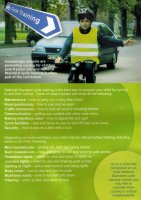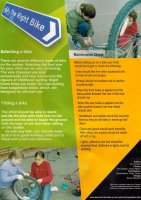Amarillo
Tom
Super Poster
VIP Member
Ahhhh! Now this is where your description of cycling differs from the reality of my boys cycling. We cycle to school in a very controlled manner. Jack following Ben's rear wheel, and me slightly to the right and behind Jack's rear wheel, controlling, by road position, any following vehicle, and communicating with hand signals and waves of "thanks for your patience". At junctions I go ahead and the boys wait until I have told them it is safe to proceed.The risk to a child falling off of a bicycle at speed in an uncontrolled environment is a different matter.
The thudguard is promoted as a mainstream product, using very similar language used by promoters of bicycle helmets. The testimonial section is nearly exclusively from those in the medical profession.























